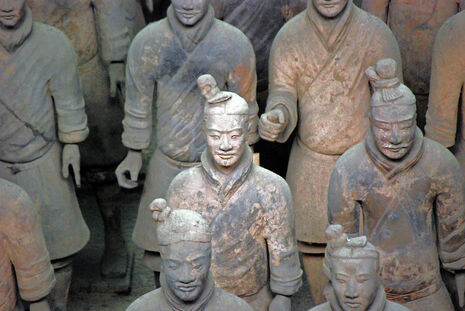I am not one billion Chinese people, nor are they me
Navigating the distinctiveness of British Asian identity in the context of discussions and debates on race is not as simple as it may seem at first sight, argues Siyang Wei

Talking to my mother about racism is something I always find confusing. When I suggested a few years ago that I’d like to study HSPS rather than the STEM degree I’d always nebulously imagined, it started a heated argument that lasted for hours and has never really ended. Eventually, that night, she vocalised the heart of her opposition: why would I, a Chinese person, not ‘play to my strengths’ and study a STEM subject, and practise my Mandarin to make up for the fact that I am not white? Don’t I know that if I study a social science, all the white employers will hire white people over me? Yet, to my question of whether or not she feels she has ever experienced racism since she moved to the UK almost three decades ago, her answer is usually, and very briefly, "no".
As the prospect of May Week hovers over the dreariness of revision, I find myself recalling the controversy surrounding last year’s Trinity Hall June Event theme, ‘Tokyo to Kyoto’, which was changed to ‘Metropolis’ following opposition from myself and a number of other East Asian students. Issues of culturally fetishistic themes seem to crop up every couple of years like terrible clockwork - luckily, 2017 seems to be an off year. But one of the most common arguments put forward in that debate particularly stuck with me. "This might be how you feel, British Chinese girl, but the real Asians in Asia don’t care" - 'real Asian' clearly, of course, implying an opinion on the issue far more valid than mine.
In this year’s controversy surrounding Doctor Strange, Ghost in the Shell, Iron Fist, and The Great Wall, I’ve seen this argument crop up time and again, wielded against dissenting Asian-Americans like something of a check-mate. It’s an absurd yet strangely powerful rhetorical flourish. Part of it is simply the age-old ‘if one non-white person said it’s fine, it’s fine!’ argument. It is also difficult for some to remember that all the members of one minority ‘racial group’ are not monolithic. Another rebuttal commonly put forward is that we, in caring about racism and BME representation, are placing too much importance on a Western-centric racial order.
"We are not born racial subjects, but become so through our location in a racialised context."
I cannot comment on behalf of all people of colour, but Chinese people in the West occupy a very different social and political position from the hegemonic position of Han Chinese within China. The ‘real Asians’ argument is an insidious iteration of a Westernised construct that race is a real and innate characteristic. The current racial reality of China is informed by a 2000-year history of Chinese cultural imperialism and a more recent history of Han ethnocentric nationalism, as much as it has been moulded too by Western colonialism. It should be no surprise then, that Han Chinese people who have grown up in the West are often vastly different beings from those raised in a country where they are the normative citizen.
What does all this mean? On a personal level, I will never find representation in Chinese serial dramas; language aside, the only culture I really know is one that is entirely different, in which people like me are marginalised. Beyond this, British Asian, Asian-American, Asian-whatever Western diasporic identities are shaped by specific experiences of Eurocentric racial alienation as much as by any links we might have left to the homeland. This is the context that bounds our specific requests, and is not one that ‘real Asians’ share. We are not born racial subjects, but become so through our location in a racialised context. To argue that the opinions of all people of the same ‘race’ matter equally in a specifically Western debate is to reify the Western construct of race as unerringly real.
My mother, who lived her formative years in a society in which people like her were an unspoken, unracialised majority, does not recognise racism in the UK even when it seemingly hits her in the face. As much as I generally respect her perspectives, it strikes me as obtuse in the extreme to defer, on issues of race, to the feelings of those who have never really experienced life this way. Perhaps the casting of Scarlett Johansson as a Japanese woman doesn’t hurt Masamune Shirow, but in my life I’ve seen a thousand white women wear my yellow face for fun and profit, and it hurts me
 News / Hundreds of Cambridge academics demand vote on fate of vet course20 February 2026
News / Hundreds of Cambridge academics demand vote on fate of vet course20 February 2026 News / University Council rescinds University Centre membership20 February 2026
News / University Council rescinds University Centre membership20 February 2026 News / Judge Business School advisor resigns over Epstein and Andrew links18 February 2026
News / Judge Business School advisor resigns over Epstein and Andrew links18 February 2026 News / Petition demands University reverse decision on vegan menu20 February 2026
News / Petition demands University reverse decision on vegan menu20 February 2026 News / Caius students fail to pass Pride flag proposal20 February 2026
News / Caius students fail to pass Pride flag proposal20 February 2026









